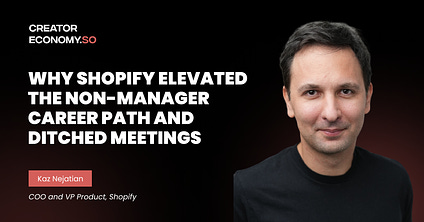Why Shopify Elevated the Non-Manager Career Path and Ditched Meetings
Level up your product and creator skills in just 5 min a week. Join 50,000+ readers:
Dear subscribers,
Today, I want to talk about how you can focus on product craft and avoid meeting bloat as your company scales.
Reading this post will feel like therapy if you’ve worked at large tech companies.
Kaz Nejatian is the VP Product and COO of Shopify. I spoke to him about:
-
How crafters and managers are different
-
How Shopify rages against meetings
-
How to protect culture as a company scales
The difference between crafters and managers
Welcome Kaz! So Tobi (Shopify CEO) recently announced that Shopify is a “craft centric” company. What’s the difference between crafters and managers?
The difference is in what you spend time on.
Most people get satisfaction from building — from actually creating things.
But most companies aren’t for crafters who want to build. They’re for people who want to manage. This creates weird incentives for builders to become managers, even when they don’t want to.
We want to make Shopify a crafter’s paradise. Our goal is to clear the obstacles for crafters to do their best work and be rewarded for it.
I’ve worked at many companies where the career ladders always seem to require product managers to become people managers. It’s always like, “If you want to be a director, you need to manage X+ people.” What are your thoughts on this?
I think traditional career ladders are broken – they just don’t work.
At Shopify, we have a management track and a crafter track. What this means is you don’t need to manage more people to get promoted and make more money.
I think this dual track approach is incredibly empowering for crafters. Is managing more people a hard job? Sure. But so is being an individual contributor (IC) leading an open-source project that impacts our entire code base. It’s just a different kind of complexity.
It’s a copout the complexity is only associated with managing more people.
I was talking to a Chief Product Officer who decided to return to a being an individual contributor. He told me that what he really loved is just working with engineers and customers. It’s ok to admit this to yourself.
As companies scale, optics start playing a larger role. People start spending more time on internal docs than actually talking to customers. How do you prevent this from happening at Shopify?
At Shopify, we rage against becoming a big bureaucratic company.
In most product reviews, product managers spend way too much time preparing the perfect presentation for execs.
At Shopify, our approach to product reviews is different. We want to see how the product actually works by playing with the demo or diving into the code.
No one ever asks in as Shopify product review: “What’s the strategy of this?” Strategy is the least meaningful aspect of whether a product is great or not.
We want our PMs to be extremely user-focused, to take full ownership over problems, and to have a high tolerance for risk.
If these attributes aren’t present, product managers tend to become “keepers of strategy.” You end up with smart, highly credentialed individuals spending all their time writing strategy memos to increase their team size so that they can write even more strategy memos.
At Shopify, our primary job is to build products, not career ladders. Therefore, we focus on the actual product that’s shipping during reviews, not the strategy behind it.


